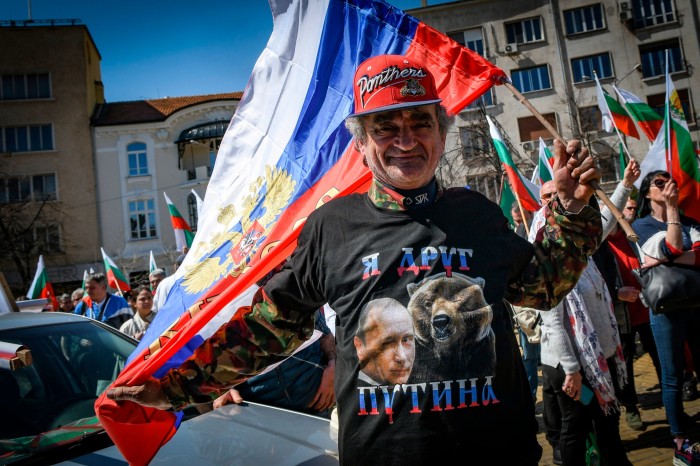A pro-Russia party campaigning against Bulgaria joining the euro is seeking to shake up the country’s politics in parliamentary elections, reflecting voters’ increasing disillusionment with corruption scandals and political bickering in Sofia.
Under the leadership of Kostadin Kostadinov, a charismatic 43-year-old academic who specialised in ethnography, Revival has struck a chord with the Bulgarian electorate after adopting a far-right stance, routinely recycling Kremlin propaganda lines and questioning the government’s support for Ukraine in its defence against Russian aggression.
While the pro-Europe parties — We Continue the Change (PP-DB) and GERB — were leading in exit polls Sunday night, the decade-old Revival, set up soon after Russia’s annexation of Crimea, is on track to win enough votes to merit inclusion in talks to form the next government. It is expected to win 14 per cent of the vote, according to exit polls, up from 10 per cent in October’s snap poll and 5 per cent in the 2021 elections. PP-DB was marginally ahead at 25.6 per cent, followed by GERB at 24.8 points, but the former is reluctant to form a coalition with its main rival.
The country’s impending adoption of the euro was one of the biggest issues as Bulgarians voted on Sunday in the country’s fifth election in two years. Revival has collected half a million signatures to support a referendum on delaying the euro’s introduction for two decades, a number which, if verified, would make it mandatory for the government to hold a vote.
“Putin has lost some popularity so the campaign is not pro-Russia but anti-west, but it’s the other side of the same coin,” said Vessela Tcherneva, a researcher at the European Council on Foreign Relations and a former government adviser on foreign policy.
“It is what the Kremlin does elsewhere,” she added. “It sows confusion, disbelief, repeats the mantra about the demise of the west — regardless of the reality on the ground.”
Russia’s invasion of Ukraine last year has deepened the political instability in Sofia that was fuelled by the ousting of conservative premier Boyko Borisov’s corruption-tainted regime in July 2021’s election.
Kostadinov, whose popular nickname is Kopeikin — a reference to Russian small change — has gained in popularity despite his clear image among voters of being a puppet for Russian interests.

Revival and Kostadinov did not respond to several FT requests for comment.
Russian propaganda claims, such as the assertion that helping Ukraine is a slippery slope that would drag the country into open conflict with Moscow, are omnipresent in Revival’s campaign.
“Contrary to the propaganda that the world is reduced to the EU and the US, we believe that it is much bigger,” Revival says in its foreign affairs programme. “Deep ties with old economic partners such as Russia . . . are important for the economic development of our country.”
Bulgaria, traditionally an ally of Russia, with whom it shares linguistic, historic and cultural ties, is a member of Nato and has been an important supplier of ammunition, small arms and fuel to Ukraine. But the non-partisan interim government and the pro-Kremlin president Rumen Radev have resisted deeper involvement, such as sending old Soviet fighter jets and anti-aircraft weapons to Ukraine.
On a recent afternoon in Sofia, Revival’s anti-euro activists were the only active campaigners. A few people signed their petition then continued their journey on the EU-funded metro line that opened two years ago.
“The European Union has been good to Bulgaria,” said Todor Ninov, a 50-year-old schoolteacher who signed the Revival petition. “But I want no inflation or other bad influence from big European countries . . . Russia does not meddle in our affairs like that.”

Bulgaria has pushed back the euro’s planned introduction next January by six months because of persistent inflation but is striving to keep the delay as short as possible, finance minister Rositza Velkova-Zheleva has said.
A strong performance at the polls will strengthen Revival’s case for delaying its launch. Its views have been amplified by its adept use of social media, with more interactions than all its rivals combined, said Goran Georgiev at the Center for the Study of Democracy in Sofia.
“After the invasion Russian proxies were clearly activated,” Georgiev said, listing several influential outlets, book publishers and social media players. He noted that only 30 per cent of Bulgarians think of Russia as a threat but that is a steep rise from 5 per cent before the war.
“Now that the first impact of the invasion wears off, there is a chance for Russia to re-establish itself,” Georgiev added.
The social media presence of Russia’s embassy in Sofia reached almost 2mn interactions in 2022 on Facebook alone, according to Georgiev. “It must be among the most successful embassy social media operations in the world,” he said. “It is more reminiscent of a propaganda outlet than an embassy page.”
Such output is echoed on Revival’s web pages, which often rehash pro-Russia commentary. “Our people love Russia [but] a quiet dictatorship rages . . . to shut down Russian information sources and stoking guilt in anyone who thinks differently,” said one such Revival repost.
Borisov’s GERB has been first or second in all four preceding elections. He told the FT he was willing to put aside differences to forge a broad coalition.
“[The west] want us to do such a [broad] power base, and they consider GERB a shield against Russian influence,” Borisov said.
The centrist PP-DB group is undecided whether to keep Borisov at arm’s length or team up with him, hinting that it would prefer to form a minority government if it wins. But Hristo Ivanov, a PP-DB leader, said the war gave Bulgaria an opportunity: isolate Revival by forming a broad pro-western government and using EU funds to jump-start the economy.
“In two years this could be a dramatically different place,” he said. “We just need to find the path there.”
